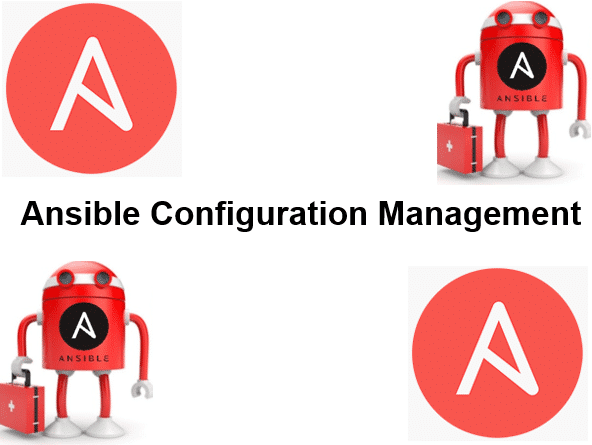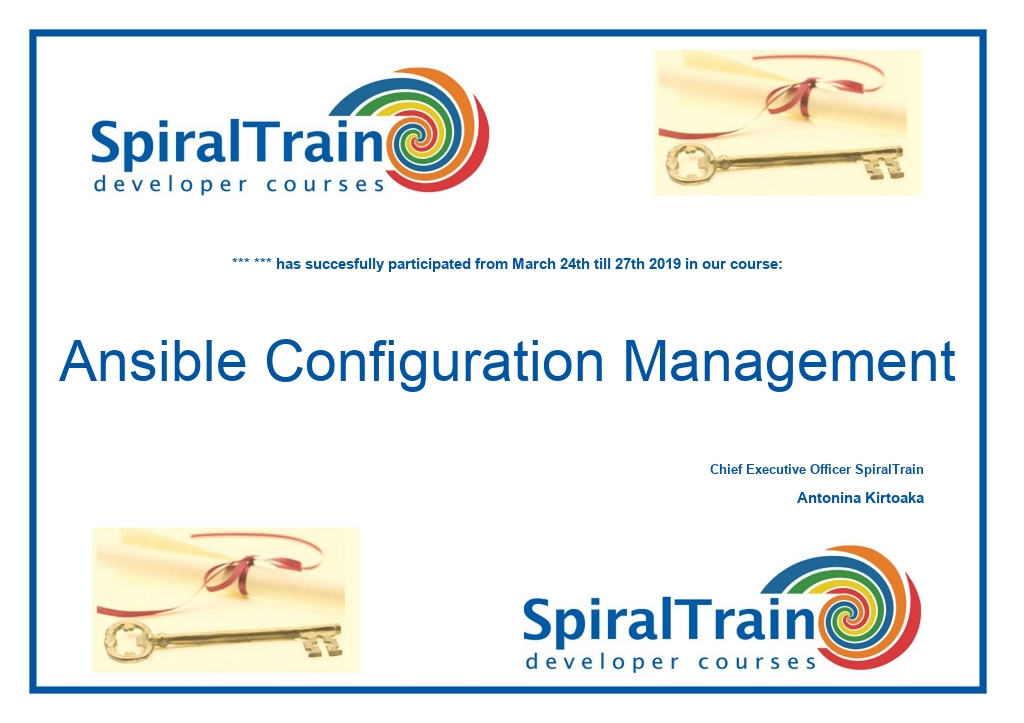-
Learning by doing
-
Trainers with practical experience
-
Classroom training
-
Detailed course material
-
Clear content description
-
Tailormade content possible
-
Training that proceeds
-
Small groups
In the course Ansible Configuration Management from SpiralTrain participants learn to use Ansible to automate the management of the IT infrastructure. Ansible is a simple open source IT engine that provides application deployment, intra service orchestration, cloud provisioning and many other IT tools. Ansible uses playbooks to describe automation tasks in the easy-to-understand configuration language YAML.
The course starts with an explanation of Ansible's multi-tier architecture that does not describe just one system, but how all systems are interrelated. Ansible does not use agents but connects to the nodes via SSH or other protocol and puts code in the form of Ansible Modules on the nodes to execute.
Next the YAML syntax is discussed. It is explained how Ansible groups the hosts with YAML in the hosts files. The joint hosts files then form the Ansible inventory.
Also attention is paid to Ansible playbooks that describe the commands, modules and tasks that are executed on a specific group of hosts from hosts files.
The precise details of automating tasks are also part of the course program. The parallelization of tasks, loops and conditional execution are treated and the use of environment variables is discussed as well.
Finally attention is paid to a number of Ad-hoc Ansible commands such as shell commands and commands for managing files and directories and Advanced Ansible topics such as Playbook Includes, Custom Modules and Plugins are discussed.
The course Ansible Configuration Management is intended for system administrators and devops engineers who want to automate system administration and application deployment with Ansible.
General experience with system management in an IT infrastructure is beneficial for the understanding.
The subject matter is discussed on the basis of presentation slides and demos. The theory is interchanged with exercises. The course material is in English. Course times are from 9.30 up and to 16.30.
After successful completion of the course participants will receive an official certificate Ansible Configuration Management.

Module 1 : Ansible Intro |
Module 2 : YAML Syntax |
Module 3 : Playbooks |
|
What is Ansible? Configuration Management Connecting Node Default SSH Connection Ansible Modules Management Node Hosts File Ansible Inventory Deployment Automation Tasks in Playbook YAML Configuration Service Orchestration Cloud Provisioning Multi-tier Deployment |
Understanding YAML YAML Start String YAML End String Indentation Key Value Pairs List Representation Abbreviations Dictionary Representation List inside Dictionary List of Dictionaries Include newlines Suppress newlines Booleans Case Sensitivity |
Target Section Variable Section Task Section Handlers Section template Module set_fact Module pause Module wait_for Module assemble Module add_host Module group_by Module slurp Module Windows Modules AWS Cloud Module |
Module 4 : Controlling Tasks |
Module 5 : Ad-hoc Commands |
Module 6 : Advanced Ansible |
|
Operations in Parallel Looping Conditional Execution Task Delegation hostvars Variable group_names Variable inventory_dir Variable Finding Files with Variables Environment Variables External Data Lookups Storing Results |
Parallelism Commands Shell Commands Passing Username File Transfers Secure Copy Protocol Managing Directories Managing Packages Gathering Facts Provisioning Ansible's Pull Mode Storing Secrets |
Playbook Includes Task and Handler Includes Role Metadata Role Defaults Custom Modules Using Bash or Python External Inventories Extending Ansible Connection Plugins Lookup and Filter Plugins Callback Plugins |
